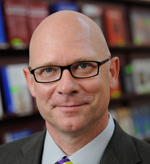
Armin Ernst, MD
Like many clinicians, Armin Ernst, MD, developed an interest in science at a young age. But unlike many of his peers who may have nurtured keen childhood interests in biology or even zoology, the young man who would grow to become chief of the division of pulmonary, critical care, and sleep medicine at St. Elizabeth’s Medical Center in Boston was interested in a different type of science.
“When I was a child, I wanted very much to become an archeologist,” recalls Dr. Ernst, who is also vice president of Critical Care and Thoracic Diseases for Steward Health Care. “My father told me I probably would not be able to support a family if I pursued that field. I had an interest in science and also in biology, and medicine seemed to me to be a field and a profession where all my diverging interests could come together.
“My interest and work in pulmonology came about in a different way, primarily because I’ve always been very interested in procedures and critical care,” he says. “Critical care and pulmonary care are closely aligned, of course, and my procedural interests landed me in interventional pulmonology, my academic area of expertise.”
A Tufts University School of Medicine professor, his work is featured in about 200 publications, and he’s edited six textbooks.
When he began his academic career, interventional pulmonology was a niche specialty area without quality outcomes research or structured training.
“At that time, laser use and airway stenting were just being introduced, and interventional pulmonology was really only applicable to patients with advanced cancer,” he recalls. “There has been an explosion over the past 20 years in academically oriented interventional pulmonology; we do proper outcomes research, we have training programs, and multiple new procedures have been developed and introduced. The techniques are not only applicable for patients with lung cancer, but are being developed for patients with asthma, emphysema, and other conditions.
“During my career, I’ve helped introduce formal outcomes evaluations for new procedures, and I’ve also pushed for structured academic education for interventional pulmonary fellowships,” he adds. “In the last two decades, the specialty went from niche to mainstream, and I like to think that maybe I was on the forefront in helping to develop that progression.”
Today, Dr. Ernst’s work has two primary foci: endoscopic emphysema and management of asthma and complex benign disorders such as tracheomalacia, for which Dr. Ernst and his colleagues are working on establishing large-animal models and innovative endoscopic treatment procedures.
“Both my academic focus and my clinical focus have been on device development and airway disorders,” he says. “Much of what I’ve done in the past has been not just to develop new devices, but also to focus on what specific devices actually do and how well they truly perform.”
Dr. Ernst’s research in high-performing systems during the past two years has led to the development of a thoracic service line at St. Elizabeth’s.
In addition to all of this, he’s completing a master’s degree in science in healthcare management.
“I’m very interested in ways to get people from different backgrounds to work together with a common goal,” he says. “My opinion is that yesterday’s silos in medicine are the jails of tomorrow. I’m trying to really get people to come together around a disease independent of their pedigree: it doesn’t matter if you’re a gastroenterologist, a pulmonologist, or a thoracic surgeon. I’m interested in figuring out how to get people to work cohesively.”
He joined the ATS in 1994. “The ATS has really helped me develop the necessary scientific background and skills that I needed to be academically successful, and provided me a forum to meet and exchange information and knowledge with other researchers,” he says. “It’s been a catalyst to develop international scientific collaborations.”
Dr. Ernst says he has no regrets about not pursuing a career in archeology. “Medicine is so varied, it’s truly incredible what you are able to do as a researcher and clinician.”
Afterhours
Dr. Ernst is a black belt in Tae Kwon Do, which keeps him physically fit and mentally focused. When not training or studying, he spends time with his wife (also a physician) and three daughters.

